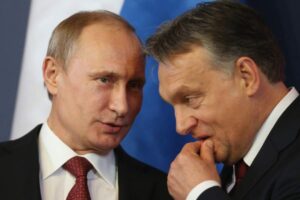In a resolution adopted on Thursday with 345 votes for, 104 against and 29 abstentions, MEPs expressed strong concern about the further erosion of democracy, the rule of law and fundamental rights in Viktor Orban’s Hungary, in particular through the recently adopted so-called ‘national sovereignty protection’ package – which has been compared with Russia’s infamous ‘foreign agents law’.
MEPs have called on the European Council to determine whether Hungary has committed “serious and persistent breaches of EU values.”
They also, in particular, condemned the actions of Prime Minister Viktor Orbán, who last December blocked the essential decision to revise the EU’s long-term budget, including the Ukraine aid package, “in full disrespect and violation of the EU’s strategic interests and in violation of the principle of sincere cooperation”.
The EU must not give in to Orban’s blackmail, they said.
MEPs also condemned the European Commission’s decision to release up to €10.2 billion of previously frozen funds, despite Hungary not fulfilling the demanded reforms for judicial independence and the Commission recently prolonging the application of Conditionality Regulation measures.
Further, MEPs condemned the reported systemic discriminatory practices against academia, journalists, political parties and civil society when allocating funds.
MEPs attack corruption in Hungary.
They also highlighted the use of manipulated public procurement procedures, takeover bids by the government and entities with ties to the Prime Minister, and the use of EU funds to enrich the government’s political allies.
The measures required to release EU funding under different rules must be treated as a single package, and no payments should be made if deficiencies persist in any area.
The European Parliament will look into whether legal action should be pursued to overturn the decision to partially unfreeze funds, and notes that it can use an array of legal and political measures if the Commission is in breach of its duties as the guardian of the Treaties and to protect the EU’s financial interests.
The upcoming Hungarian Presidency of the Council
In light of these issues, Parliament questions if the Hungarian Government will be able to fulfil its duties in the second half of 2024, warning that, if the position of President of the European Council is vacant, those duties would fall to the Hungarian Prime Minister during the country’s six-month Presidency of the Council.
MEPs have asked the European Council to find proper solutions to mitigate these risks, and call for reforms to the Council’s decision-making process, to end the abuse of the right of veto and blackmail.
Controversies surrounding Hungary’s accession to the EU – nothing new.
Hungary’s accession to the EU has been a topic marred by controversies and debates since the country officially joined the bloc in 2004.
One significant controversy revolves around concerns regarding Hungary’s commitment to democratic values and the rule of law.
Over the years, Hungary, under the leadership of Prime Minister Viktor Orbán and his Fidesz party, has faced criticism for perceived erosion of democratic institutions, media freedom, and judicial independence.
Orbán’s government has implemented a series of constitutional changes and reforms that some critics argue undermine the checks and balances necessary for a healthy democracy.
Centralisation of power, curtailment of media freedom through the consolidation of media ownership, and changes to electoral laws have raised eyebrows both within Hungary and among EU member states.
Critics argue that these actions threaten the core principles that underpin the EU.
Another contentious issue has been Hungary’s stance on migration.
Orbán’s government has adopted a hardline approach against accepting refugees, openly challenging the EU’s common migration policy. This has led to tensions with other EU member states, as the bloc grapples with finding a unified approach to address the refugee crisis.
Furthermore, Hungary’s relations with the EU have been strained due to its perceived resistance to certain EU policies, particularly on issues such as the rule of law and human rights.
The EU has initiated various measures, including legal proceedings and the activation of Article 7 of the Treaty on European Union, to address concerns about Hungary’s adherence to the EU’s fundamental values.
This week’s resolution underscores the challenges of balancing national sovereignty with the shared values and commitments required for membership of the EU.
______________________________________________________________________________________________________________________________________

Read also: Putin’s “Trojan horse” in the EU Viktor Orban criticises sanctions against Russia.
“Orban, long at odds with the EU over some of his policies seen in Brussels as anti-democratic, urged a ceasefire to end the war and said the sanctions against Russia were dealing a blow to Europe’s economy.”
______________________________________________________________________________________________________________________________________

Follow EU Today on social media:
Twitter: @EU_today
Facebook: https://www.facebook.com/EUtoday.net/
https://www.facebook.com/groups/968799359934046
YouTube: https://www.youtube.com/@eutoday1049




